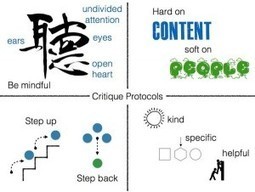Photo credit: Improvisation Ability SAK
Sean Morris:
For example, find a way to allow your students to not just create discussions on their own, but to make those discussions not at all peripheral to the main thrust of the learning. Have students decide not what they want to discuss, but what discussions are necessary to the class. And here, I’m not talking about students voting on discussion topics that you create, but creating their own ideas for what can and should be discussed about the subject matter.
Another option: allow students to bring their own materials to bear on the learning. Ask them to write—asynchronously—a collaborative manifesto for the class that supplements (and sometimes overrides) the syllabus. If you’re teaching Moby Dick let them decide how best to embrace the book. Will they write reports, or make papier maché whales? Will they give video presentations, or collaboratively write a comic for the book online? Whatever they come up with, be prepared to invent right alongside them.
Via
Fab GOUX-BAUDIMENT



 Your new post is loading...
Your new post is loading...










